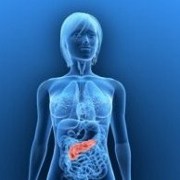 Photo: Getty Images
Photo: Getty Images
Helicobacter pylori infection is recognized as an important cause of gastric cancer. It may also contribute to pancreatic cancer risk, according to a new report from the University of Connecticut Medical Center.
Dr. Guru Trikudanathan and colleagues performed an analysis of pooled data from six studies with a total of 2,335 patients, and found an association between H. pylori infection and development of pancreatic cancer. They recommend further work on this line of research.
Identification of risk factors that can be modified is of great importance for pancreatic cancer, Trikundanathan explained, because this type of cancer is so difficult to find and treat.
“There is no effective screening disgnostics; therefore, most patients present with metastatic or advanced disease, not amenable to surgery,” he wrote.
Pancreatic cancer is the fourth leading cause of cancer death in both women and men. The estimated number of new cases was 42,470 in 2009, with 35,240 deaths.
Trikundanathan chose H. pylori for study because of its association with other types of cancer. Colorectal, hepatocellular (liver), lung, and laryngeal cancers have all been associated with H. pylori in literature cited in Trikundanathan's paper, in addition to gastric cancer.
Several mechanisms have been proposed to explain the risk of pancreatic cancer. The bacteria may infect pancreas cells and produce malignant changes directly. Alternatively, infection of the stomach may produce changes in the digestive system that indirectly promote cancer growth in the pancreas.
The U. S. National Library of Medicine's PubMed web site reports that as many as half the world's population is infected with H. pylori. Some infected individuals have no symptoms. Others develop ulcers or gastritis.
Factors associated with increased risk include:
1. Smoking
2. Drinking coffee or alcohol
3. Living in crowded or unsanitary conditions
4. Age greater than 45 years
5. Gastrointestinal symptoms or anemia
H. pylori can be detected by breath, blood, and stool tests. Upper endoscopy is the most accurate diagnostic procedure, and is used for patients at high risk for complications. Treatment includes antibiotics, proton-pump inhibitors, and bismuth subsalicylate (Pepto-Bismol).
Trikudanathan listed other risk factors for pancreatic cancer as older age, cigarette smoking, African-American race, chronic pancreatitis, obesity, type 2 diabetes, consumption of smoked or processed meat, and genetic factors.
References:
1. Trikudanathan G et al, “Association between Helicobacter pylori infection and pancreatic cancer. A cumulative meta-analysis”, Journal of Pancreas (Online) 2011 Jan 5; 12(1): 26-31. http://www.ncbi.nlm.nih.gov/pubmed/21206097
2. Helicobacter pylori. PubMed. Web. Oct. 2, 2011.
http://www.ncbi.nlm.nih.gov/pubmedhealth/PMH0001276
Linda Fugate is a scientist and writer in Austin, Texas. She has a Ph.D. in Physics and an M.S. in Macromolecular Science and Engineering. Her background includes academic and industrial research in materials science. She currently writes song lyrics and health articles.
Reviewed October 10, 2011
by Michele Blacksberg RN
Edited by Jody Smith





Add a CommentComments
There are no comments yet. Be the first one and get the conversation started!